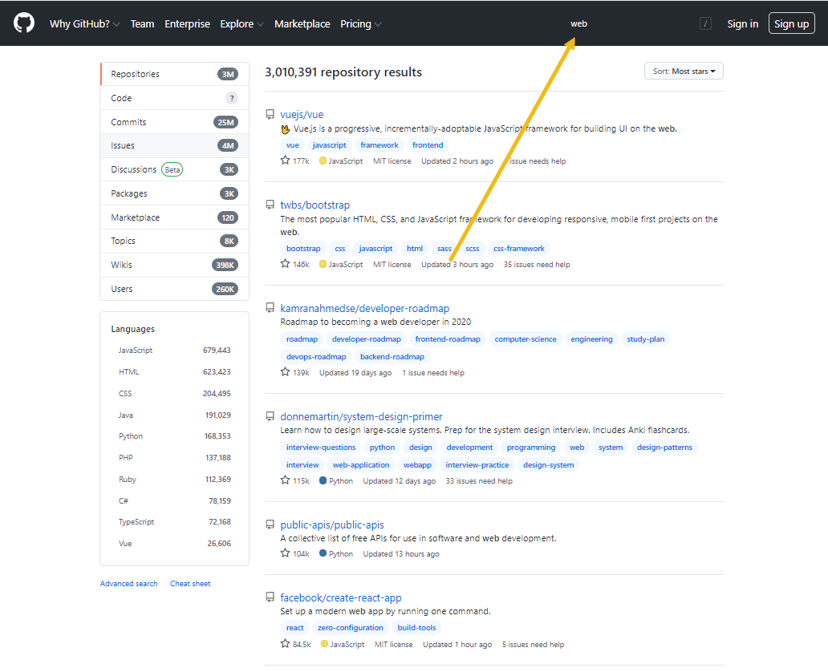Many beginners have learned how to develop for the web using online educational sites like CodinGame, W3Schools, and Udemy. While expert programmers certainly use these sites, so do novice programmers who learn the basics, but who lack experience.
Finding genuinely skilled and accomplished web developers in a sea of amateurs is challenging.
How can you identify a seasoned web developer? Where can you find them?
This guide will show you where to look and what to look out for on your hunt for an excellent web developer.
Oh, by the way, we’ve put all of our articles and resources on how to find and hire developers here.
What does a web developer do?
The definition of a web developer is a software engineer who develops websites and web applications.
Some people confuse a web developer with a web designer. A web designer plans the visual appearance and user experience of a website or web app. On the other hand, a web developer creates a functional website or app based on those visual designs.
A designer doesn’t always know what is and isn’t technically possible. A web developer follows a designer’s designs as much as possible to create the planned user experience. However, a developer sometimes has to suggest design changes to make them possible to implement.
What do I need to know before hiring a web developer?
A web developer will work on both the front end and back end of a website or web application.
The front end is primarily the user interface. The front end also communicates with the back end to request data that’s subsequently displayed to the user on the front end.
The back end of a web application carries out many tasks, such as sending data and resources back to the front end, accessing databases, and checking user account login details.

While a web developer may have some knowledge of the front end, back end, databases, and how they all communicate, few web developers are masters of all aspects of web development.
What are the requirements for web developers?
A web developer must know how to build a web application’s front end, back end, database, and how to fit them all together.
Front-end languages
All webpages are written using HTML, CSS, and JavaScript. So, every web developer must be comfortable with these.
A web developer can create web front ends using a framework, such as React or Angular. These frameworks generate HTML and CSS from JavaScript alone. Basic HTML and CSS knowledge is still required.
Back-end languages
A good web developer will be familiar with many different programming languages that they can use to create the back end of a web app, such as Ruby, JavaScript, Python, Java, and PHP.
These days, JavaScript can achieve almost any functionality on the back end thanks to frameworks like Node.js. The issue with using JavaScript for everything is that it can be slower than other programming languages when performing certain tasks.
A good web developer will select the programming language that’s best suited for the desired functionality of your web app, rather than defaulting to the language that they’re used to.
Database languages
A web developer must know how to access data from whatever type of database they are using. For example, they could use Structured Query Language (SQL) to query a MySQL or SQLite database.
Tech stacks
Most web developers have a lot of experience with just one tech stack. In other words, they tend always to use the same language or framework on the front end, the same language or framework on the back end, and the same type of database.
Popular tech stacks include:
- Ruby on Rails: The Ruby-based framework Ruby on Rails is used to create the back end of an application. The Ruby on Rails framework serves JavaScript scripts and webpages to the front end of an application, and accesses data from an SQLite database.
- The MEAN stack: The JavaScript-based Node.js and Express frameworks are used to create the back end of an application. Node.js accesses data from a MongoDB database. The JavaScript-based AngularJS framework is used to create the front end.
- The Django stack: The Python-based framework Django is used to create the back end of an application. Django serves JavaScript scripts and webpages to the front end, and accesses data from a MySQL database.
A good web developer won’t choose the tech stack that they’re most comfortable with for every project. They’ll choose the tech stack that’s most suitable for the requirements of the application.
No web developer is a master of every technology stack, but the best developers are comfortable with more than one.
Where can I find a web developer?
Here are the top 5 places to find a web developer.
The in-person interaction aspect of live events enables you to build genuine relationships with web developers faster than you could with any online method.
Some of the biggest and best web development events are DevTernity, Full Stack Europe, and Craft Conf. You can find more here.
Aim to be the person every web developer wants to talk to at live events and the person everyone remembers when the event is over.
Some live events allow you to set up a booth. Use your booth to attract web developers to come over to talk with you about your job opportunities. Make your booth better than anyone else’s by offering an interactive experience, such as a mini-hackathon or a multiplayer VR game.
Attend university and college career fairs if you want to find a web developer who’s currently a student. The benefit of recruiting student web developers is that they don’t know how in-demand they’ll be when they graduate.
CodinGame Sourcing uses powerful matching algorithms to connect you with web developers who best fit your needs.
The best web developers are already busy working on existing projects and commitments. CodinGame Sourcing can get your job offers in front of these developers.
Try CodinGame Sourcing for free now!
- Public code repositories
Developers of any skill and experience level can make the code for their projects publicly available. They can publish to code repositories, such as GitHub.
On GitHub, users vote for their favorite projects uploaded by other developers. The publishers of the most up-voted web development projects are usually expert developers.
You can easily find the most popular web development projects on GitHub by looking at the trending page. Filter by a web development language, like HTML, CSS, or JavaScript, to see the most relevant projects. Or search “web” using the GitHub search engine.

Find the most up-voted projects and reach out to whoever uploaded them with your job opportunities.
- Freelance job websites
You have a few options if you want to hire a freelance web developer.
Upwork and Freelancer are the largest freelance jobs websites. You’ll find a seemingly endless supply of web developers on these sites, although many won’t be at the standard you want or need.
You can hire through Upwork and Freelancer cheaply. The downside is having to screen a large number of applicants to find someone suitable.
If you’re willing to pay more for the convenience of dealing only with pre-screened web developers, try Toptal and TopCoder.
With Toptal, you know that anyone you’re considering already passed Toptal’s stringent application tests. Toptal’s tests include technical knowledge questions and the development of a start-to-finish web project. Toptal claims that only 3% of developers pass the tests.
You’d also benefit from checking out Guru, YouTeam, Gun.io, 10X Management, Codeable, and WeWorkRemotely.
- Social media platforms
The best social media platform to use to find a web developer is LinkedIn.
LinkedIn gives you the unique ability to search for developers based on their skills.
Developers can add web development skills to their profiles, such as knowledge in HTML, CSS, JavaScript, AngularJS, Node.JS, React, PHP, and Ruby.
Search LinkedIn for the skills that are most applicable to your project to find suitable web developers.
The beauty of LinkedIn is that other LinkedIn users can endorse skills. You can spot a good web developer by looking at how much endorsement their skills have from other well-established developers.
Recruiters spam developers on LinkedIn with job opportunities. If you want a response to your messages, don’t do what all the other recruiters are doing. Instead, make sure your message is personal and relevant, and give valuable information on your project.
Unfortunately, reply rates are generally low on social media platforms like LinkedIn. You can reach unprecedented reply rates with tools such as CodinGame Sourcing. You’re only put in touch with developers who have confirmed their availability and their desire to be contacted. It’s a lot less frustrating!
How to choose a web development company
If you have a more complex need and would like to work with an external team, a web development company can be an excellent choice. There are many to choose from but if you pay attention to these 5 points, you will find the perfect one for you.
Check out the following:
- Their website
The website will give you an important first impression. It is not only a window to their business but also a chance to show off their web development skills. You should also find enough information to start narrowing down your choices.
- The portfolio
An agency should have a portfolio available to evaluate their work. This should be accessible directly on their site but you may also search for the name of the agency to see if they have profiles elsewhere. Make sure the portfolio shows similar projects to what you have in mind.
- Case studies
Case studies will give you a deeper understanding of the type of projects the web development agency does and their level of involvement. It should also show projects of which they’re proud and of which the client is happy (unhappy clients are unlikely to consent to a case study). A detailed case study will also give an indication of how the agency works.
- Their support
Oftentimes, there will be things to modify or improve after a site or app goes live. No matter how you test in advance, you need to be prepared for a surprise or two. This is why you want an agency that continues to offer support after the project is completed and live. It can be very stressful to find out that the other party considers the project closed when you are only just discovering what needs to be improved.
- Reviews and ratings
A reputable agency should have reviews available. These might be found on a variety of sites so don’t just rely on the testimonials or ratings they choose to share on their homepage. Do a search and check out a variety to get an overall view. Like with any business, some glowing reviews may have been solicited and some scathing reviews exaggerated but if you read as many as you can find, it should provide you with a global view.
–
Which languages or frameworks will a web developer need to know to work on your project?
What level of experience will a web developer need to work on a project as complicated or simple as yours?
Do you want a full-time employee or a freelancer?
Each of these factors will determine which place is best for you to find a web developer.

